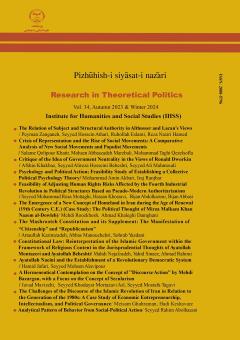The fourth industrial revolution and its human dangers in quasi-modern authoritarian political systems
Subject Areas : Research in Theoritical Politics
Seyyed MohammadReza Mottaghi
1
![]() ,
hasan khosravi
2
,
hasan khosravi
2
![]() ,
Bijan Abdolkarimi
3
,
Bijan Abdolkarimi
3
![]() ,
Bijan Abbasi
4
,
Bijan Abbasi
4
1 - PhD of Public law, North Tehran Branch, Islamic Azad University, Tehran, Iran.
2 - Associate Professor, Department of Public Law, Payam Noor University, Tehran, Iran.
3 - Associate Professor, Department of Philosophy, North Tehran Branch, Islamic Azad University, Tehran, Iran.
4 - Associate Professor, Department of Public Law, University of Tehran, Iran.
Keywords: Fourth industrial revolution, authoritarianism, pseudo-modern state, artificial intelligence,
Abstract :
Feasibility of Adjusting Human Rights Risks Affected by the Fourth Industrial Revolution in Political Structures Based on Pseudo-Modern Authoritarianism
Seyyed Mohammad Reza Mottaghi*
Hassan Khosravi**
Bijan Abdolkarimi***
Bijan Abbasi****
The Fourth Industrial Revolution represents a transformative wave in the industry with the potential to impact various facets of human existence, promising widespread individual and societal prosperity. However, it also presents a significant risk, particularly for governments not firmly rooted in democratic principles, who may be tempted to assert control over their citizens due to the expanded capabilities afforded by this revolution. Such a scenario, if realized, threatens the emergence of new dictatorships and erodes the individuality of citizens. This article, employing an analytical-descriptive approach, seeks to explore the multifaceted human rights crises precipitated by these conditions. It endeavors to address the question: How can individual freedoms and human and citizenship rights be safeguarded against governmental encroachment in this era? Based on the results of this research, due to the expansion of capabilities arising from the Fourth Industrial Revolution, the potential for government abuse is increasing more than ever, inviting all political structures towards authoritarianism. Consequently, to prevent this situation and safeguard the rights and freedoms of citizens, the current governance models need to be re-evaluated, emphasizing on aspects of enhancing freedoms. These changes should aim to reduce the intrusion of governments into personal spheres as much as possible, moving towards absolute neutrality.
Keyword: The fourth industrial revolution, authoritarianism, cyber dictatorship, pseudo-modern government and artificial intelligence.
* PhD of Public law, North Tehran Branch, Islamic Azad University, Tehran, Iran.
mohammadreza.mottaghi@iranian.ac.ir
** Corresponding Author: Associate Professor, Department of Public Law, Payam Noor University, Tehran, Iran.
h.khosravi@rey.tpnu.ac.ir
*** Associate Professor, Department of Philosophy, North Tehran Branch, Islamic Azad University, Tehran, Iran.
abdolkarimi12@gmail.com
**** Associate Professor, Department of Public Law, University of Tehran, Iran.
Bizhan_abbasy@yahoo.com
